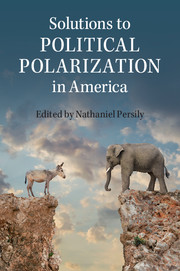Book contents
- Frontmatter
- Dedication
- Contents
- Contributors
- Introductory Chapters
- Reforming the Electoral System
- 4 Polarization and Democratization
- 5 Eroding the Electoral Foundations of Partisan Polarization
- 6 Solutions to Polarization
- 7 Geography and Gridlock in the United States
- Strengthening Parties
- Empowering and Informing Moderate Voters
- Lowering Barriers to Policy Making
- Index
- References
6 - Solutions to Polarization
from Reforming the Electoral System
Published online by Cambridge University Press: 05 May 2015
- Frontmatter
- Dedication
- Contents
- Contributors
- Introductory Chapters
- Reforming the Electoral System
- 4 Polarization and Democratization
- 5 Eroding the Electoral Foundations of Partisan Polarization
- 6 Solutions to Polarization
- 7 Geography and Gridlock in the United States
- Strengthening Parties
- Empowering and Informing Moderate Voters
- Lowering Barriers to Policy Making
- Index
- References
Summary
Polarization makes it far more difficult to conduct the essential tasks of governance, from passing a budget that would keep the government functioning, to staffing an administration. And polarization makes it almost impossible to address complex problems whose solutions require bipartisan support. Polarization does make it easier for elected officials to cross the line separating robust democratic discourse from deliberate misrepresentation and personal calumny. It contributes to diminished trust and confidence in our public institutions, and it leads to a view of politics as warfare in which contested issues are never resolved but rather are endlessly re-litigated.
Polarization has, at its roots, deeply held philosophical differences about the public sphere and what should or should not go on there. Short of one side finally winning the argument – through gradual demographic change or sudden catastrophic change – we have no easy answers for resolving deeply held differences. What we can do, however, is look at how our democracy is structured and examine the possibility that changes in the structure of government and politics might reduce some of the most severe political polarization.
Hence, what follows are three ideas for structural reforms that might mitigate some of the worst aspects of polarization and a final note on why they may not be necessary after all.
IDEA #1: REFORM CONGRESSIONAL PRIMARIES IN WAYS THAT WILL INCREASE TURNOUT
Low turnout is an enduring characteristic of all primary elections, and congressional primaries are no different. Turnout (as a percentage of voting age population [VAP]) in congressional primaries does not even break into double digits in a year like 2010 when a great deal of attention was paid to primaries. Turnout in contested primaries in 2010 was 7.5% of VAP, compared to turnout in contested primaries in 2006 of 4.6% of VAP and in 2002 of 5.4% of VAP (Galston and Karmarck 2011).
- Type
- Chapter
- Information
- Solutions to Political Polarization in America , pp. 96 - 103Publisher: Cambridge University PressPrint publication year: 2015
References
- 2
- Cited by



